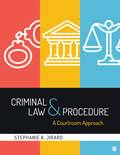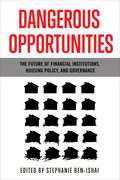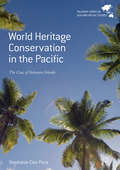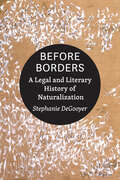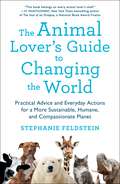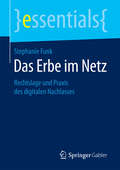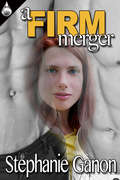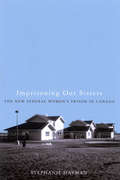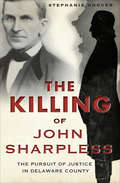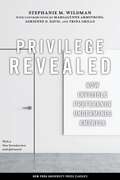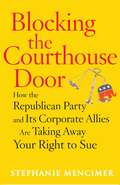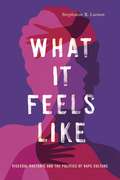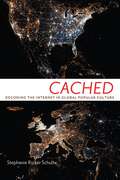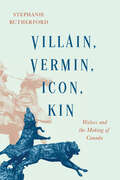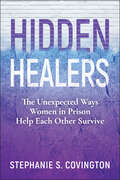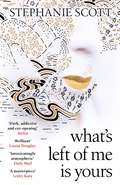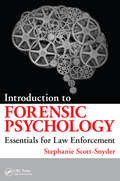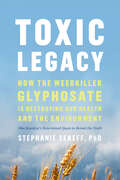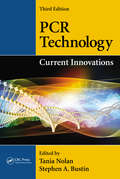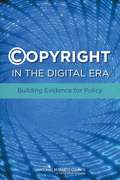- Table View
- List View
Criminal Law and Procedure: A Courtroom Approach
by Stephanie A. JirardWritten by a former federal prosecutor and public defender, Criminal Law and Procedure: A Courtroom Approach introduces students to the essentials of criminal law and procedure by illuminating the legal issues justice professionals face before, during, and after a criminal trial. Through the examination of statutes, edited case excerpts, and recent constitutional interpretation of black letter law, the text bridges the gap between learning criminal procedure and applying criminal law. Drawing from author Stephanie A. Jirard’s vast experience in both the courtroom and the classroom, Criminal Law and Procedure gets students to think critically about real-world issues and practice applying the law in a just and meaningful way. Accessible and engaging, this text presents criminal law and procedure as an exciting opportunity to have a direct, positive impact on our communities and the criminal justice system. Key Features: "Making the Courtroom Connection" boxes help students apply the legal concepts they learn to real-life issues facing law enforcement, the court system, and correctional institutions today. Edited case excerpts connect criminal law and procedure with current case material on relevant topics so students can see the impact of judicial decision making. "Applying the Law to the Facts" boxes engage students’ critical thinking skills and enhance their logical problem-solving abilities by providing opportunities to apply the rule of law to different scenarios. "Springboard for Discussion" prompts spark conversations and invite students to contrast the moral, ethical, and legal implications of criminal law and procedure in a larger context. Problem-solving exercises at the end of each chapter provide students with opportunities to test themselves on the material before a formal assessment. Active Learning Exercises in the Instructor’s Manual enable professors to offer additional opportunities for experiential learning. Give your students the SAGE edge! SAGE edge offers a robust online environment featuring an impressive array of free tools and resources for review, study, and further exploration, keeping both instructors and students on the cutting edge of teaching and learning.
Dangerous Opportunities: The Future of Financial Institutions, Housing Policy, and Governance
by Stephanie Ben-IshaiThe 2017 Home Capital saga represents the shortcomings of a financial system challenged by distinct, siloed regulatory frameworks that fail to communicate with each other. Home Capital is a publicly traded company that acts as a lender through the Home Trust Company, most often providing mortgages to clients rejected by traditional banks. Home Capital’s 2017 announcement that it required $2 billion to sustain a $600 million loss shook customer confidence, and fueled by allegations of corruption, they suffered a rapid decline in stock price. The Home Capital crisis is the most recent pre-pandemic example of systemic risk in the financial sector in Canada and highlights the invaluable opportunity that we have in avoiding past mistakes in the nearing post-pandemic economic reality. Dangerous Opportunities sheds light, using the 2017 Home Capital saga as a starting point, on the compartmentalization of regulators and its greater ramifications on board independence and corporate governance, taxation in the competitive house context, and non-bank financial institutions’ success in various jurisdictions. A hybrid of law and business, Dangerous Opportunities is a must read for those interested in the underbelly of financial institutions, and is an inspired read in the aftermath of the recent housing crisis which saw many desiring-homeowners seeking dangerous opportunities outside of the traditional banking system.
World Heritage Conservation in the Pacific: The Case of Solomon Islands (Palgrave Series in Asia and Pacific Studies)
by Stephanie Clair PriceThis book explores the opportunities and challenges associated with the legal protection of World Heritage sites in the Pacific Islands. It argues that the small Pacific representation on the World Heritage List is in part due to a lack of strong legal frameworks for heritage conservation, putting such sites under threat. Providing a comprehensive analysis of the nomination, listing and protection of the Solomon Island World Heritage Site, it examines the implementation of the World Heritage Convention in the Pacific context. It explores how the international community’s broadening interpretation of the notion of ‘outstanding universal value’ has increased the potential for Pacific heritage to be classified as ‘World Heritage’. This book also analyses the protection regime established by the Convention, and the World Heritage Committee’s approach to heritage conservation, identifying challenges associated with the protection of Pacific Island heritage.
Health Workforce Governance: Improved Access, Good Regulatory Practice, Safer Patients (Law, Ethics And Governance Ser.)
by Stephanie D. ShortWith increasing recognition of the international market in health professionals and the impact of globalism on regulation, the governance of the health workforce is moving towards greater public engagement and increased transparency. This book discusses the challenges posed by these processes such as improved access to health services and how structures can be reformed so that good practice is upheld and quality of service and patient safety are ensured. With contributions from regulators, academics, lawyers and health professionals, this book presents arguments from multiple perspectives. Of global relevance, it brings together concerns about access, quality and safety within the framework of the health workforce governance continuum and will be of interest to policy makers, regulators, health professionals, academics legal practitioners, insurers, students and researchers.
Before Borders: A Legal and Literary History of Naturalization
by Stephanie DeGooyerAn ambitious revisionist history of naturalization as a creative mechanism for national expansion.Before borders determined who belonged in a country and who did not, lawyers and judges devised a legal fiction called naturalization to bypass the idea of feudal allegiance and integrate new subjects into their nations. At the same time, writers of prose fiction were attempting to undo centuries of rules about who could—and who could not—be a subject of literature. In Before Borders, Stephanie DeGooyer reconstructs how prose and legal fictions came together in the eighteenth century to dramatically reimagine national belonging through naturalization. The bureaucratic procedure of naturalization today was once a radically fictional way to create new citizens and literary subjects.Through early modern court proceedings, the philosophy of John Locke, and the novels of Daniel Defoe, Laurence Sterne, Maria Edgeworth, and Mary Shelley, DeGooyer follows how naturalization evolved in England against the backdrop of imperial expansion. Political and philosophical proponents of naturalization argued that granting foreigners full political and civil rights would not only attract newcomers but also better attach them to English soil. However, it would take a new literary form—the novel—to fully realize this liberal vision of immigration. Together, these experiments in law and literature laid the groundwork for an alternative vision of subjecthood in England and its territories.Reading eighteenth-century legal and prose fiction, DeGooyer draws attention to an overlooked period of immigration history and compels readers to reconsider the creative potential of naturalization.
The Animal Lover's Guide to Changing the World: Practical Advice and Everyday Actions for a More Sustainable, Humane, and Compassionate Planet
by Stephanie Feldstein"This book belongs on every animal lover's shelf—and it's a particularly great gift for young people who are on fire to save animals but are unsure where to start. Hooray!!" —Sy Montgomery, author of The Good Good Pig and The Soul of an OctopusThe Animal Lover's Guide to Changing the World is the inspiring, accessible, and empowering book for everyone who loves animals and wants to live a more animal-friendly life, even if they aren’t ready to join a movement or give up bacon. With more than 7.5 billion people on the planet, wildlife is going extinct at the fastest rate since the dinosaurs. Three to four million dogs and cats are killed in shelters every year; billions of chickens, pigs, and cows are killed for food; and countless animals are killed in research labs or their habitat. The numbers are daunting, but there’s good news too! Even one person truly can make a difference without breaking the bank.With Stephanie Feldstein's straightforward and encouraging guidance, readers will learn how to take action to create a better world for the animals we love. It starts with changes as simple as taking a shorter shower, skipping meat once a week, wearing "this" not "that," and extends all the way to online activism and politics.The animals need us, so let's get on with some world changing!
Das Erbe im Netz: Rechtslage und Praxis des digitalen Nachlasses (essentials)
by Stephanie FunkDieses essential ordnet den digitalen Nachlass in den rechtlichen Gesamtkontext ein, beantwortet die vielschichtigen juristischen Fragestellungen, die das ,,Erbe im Netz" mit sich bringt, und beleuchtet die ersten Rechtsprechungsans#65533;tze zu diesem Thema. Stephanie Funk zeigt, welche M#65533;glichkeiten f#65533;r den k#65533;nftigen Erblasser zu Lebzeiten bestehen, sein digitales Erbe nach eigenen W#65533;nschen zu lenken, vor allem durch ein Testament. Auch die Regelungsm#65533;glichkeiten im Rahmen von Vorsorgevollmachten f#65533;r den Fall der lebzeitigen Gesch#65533;ftsunf#65533;higkeit werden in diesem Zusammenhang vorgestellt. Der Leser erf#65533;hrt, welche Optionen es f#65533;r Erblasser und Erben gibt, um mit den Daten und Spuren umzugehen, die wir alle im Internet hinterlassen - seien es Passw#65533;rter, E-Mails, Blogbeitr#65533;ge, Fotos, Videos oder Dokumente. Das Hauptaugenmerk liegt dabei auf der E-Mail-Korrespondenz als Kernst#65533;ck der Internett#65533;tigkeit.
A Firm Merger
by Stephanie GanonWorking at a law firm has taught Emily Dawson a thing or two about mergers and acquisitions. This serves her well when the two men she's dating learn about each other. It's time for a compromise that will satisfy them all!For nearly a year, Emily Dawson has quietly dated two men, Nick Scott and William Drake--both smart, attractive and great in bed. Because they all work at the same law firm, her various needs are met at a moment's notice. During an out-of-town business trip, the men put their heads together and discover their girlfriend has two boyfriends. But when Nick and William confront Emily about her refusal to commit to a relationship, an unusual compromise is reached--one that satisfies them all. Content Notes: Partner sharing; gay sex
Imprisoning Our Sisters
by Stephanie HaymanUsing extensive interviews and previously unexplored archival material, Hayman examines the work of the Task Force on Federally Sentenced Women and assesses the opening of the first three prisons. She questions the notion that prisons can simultaneously "heal" and punish, suggesting that the power of "the prison" inevitably triumphs over the good intentions of reformers.
Imprisoning Our Sisters: The New Federal Women's Prisons in Canada
by Stephanie HaymanUsing extensive interviews and previously unexplored archival material, Hayman examines the work of the Task Force on Federally Sentenced Women and assesses the opening of the first three prisons. She questions the notion that prisons can simultaneously "heal" and punish, suggesting that the power of "the prison" inevitably triumphs over the good intentions of reformers.
The Killing of John Sharpless: The Pursuit of Justice in Delaware County (True Crime Ser.)
by Stephanie HooverThe Pennsylvania historian &“deftly investigates turn-of-the-century law (such as it was) to find fresh answers&” in a controversial 19th century murder (Main Line Today). On a stormy November evening in 1885, John Sharpless answered a knock on his door. Less than an hour later, he was found dead in his barn from a blow to the back of the head; his bloodstained hat lay next to him on the ground. A three thousand dollar reward for the killer sparked an overzealous bounty hunt across southeastern Pennsylvania, and numerous innocent men were arrested. Samuel Johnson—a local African American man with a criminal record—was charged. Despite the Widow Sharpless&’s insistence that Johnson was not the man who had come to their door, he was tried and sentenced to hang. Author Stephanie Hoover offers an in-depth investigation of the crime. From the events of that night and the mishandling of the investigation by a corrupt police force to the trial and conviction of Johnson and the efforts of the Quaker community to appeal the sentence, Hoover profiles a miscarriage of justice in Delaware County. Includes photos
Limited Scope Legal Services: Unbundling and the Self-Help Client
by Stephanie L. KimbroBy providing representation for a clearly defined portion of the client's legal needs, such as preparing a legal document or making limited court appearances, lawyers can market their practice to an entirely new client base and give their firm a competitive advantage. The only book available on the topic, Limited Scope Legal Services provides lawyers of all types--from solo to big law--with practical solutions for setting up unbundling practices in their firms.
Virtual Law Practice: How to Deliver Legal Services Online
by Stephanie L. KimbroThe legal market has recently experienced a dramatic shift as lawyers seek out alternative methods of practicing law and providing more affordable legal services. Virtual law practice is revolutionizing the way the public receives legal services and how legal professionals work with clients. Stephanie Kimbro's practical guide teaches lawyers how to set up and run a virtual law firm. It provides case studies of individual virtual law practices along with client scenarios to show how web-based technology may be used by legal professionals to work with online clients and avoid malpractice risks.
Privilege Revealed: How Invisible Preference Undermines America (Critical America #48)
by Stephanie M. WildmanAn in-depth examination of the different forms of privilege perpetuating inequality within American societyIn this era of #MeToo and #BlackLivesMatter, inequality is at the forefront of American thought like never before. Yet many of the systems of privilege upholding the status quo remain unchanged. Many Americans who advocate a merit-based, race-free worldview do not acknowledge the systems of privilege which benefit them. Men remain at the top of the gender wage gap and white people are five times less likely to be stopped by police than their Black neighbors. White families can build lives using social and financial inheritances that have been denied to Black Americans and immigrants for centuries. Individual chapters focus on language, the workplace, the implications of comparing racism and sexism, race-based housing privilege, the dream of diversity and the cycle of exclusion, the rule of law and invisible systems of privilege, and the power of law to transform society.Twenty-five years since its first publication, Privilege Revealed is more relevant than ever. With a new preface and substantive foreword, this book offers readers important insight into the inequalities still pervading American society and encourages us all to confront our own relationship to these too often invisible privileges.
Blocking the Courthouse Door
by Stephanie MencimerThanks to constant political oratory against "frivolous lawsuits" and "jackpot justice," it is widely known that there's a legal crisis in this country. President Bush never misses an opportunity to call for laws that would bring more "common sense" to a legal system that, he claims, is out of control, wrecking the economy, driving doctors out of their practices, bankrupting small businesses, and costing American jobs. Journalists repeat the charges without examining them. As a result, the lawsuit issue has moved to the political front burner, and in the past three years, state after state has responded by limiting citizens' rights to sue. Just this year alone, the Republicanled Congress has passed restrictions on class action lawsuits and is steps away from enacting limits on medical malpractice lawsuits. But is there really a crisis? National data show that the number of civil suits is falling, not rising, and that the average damage award is also going down. Despite intense media hype to the contrary, the number of personal injury lawsuits filed every year has been tumbling for the past decade. Upon closer examination, the stories of ridiculous lawsuits usually turn out to be false or badly misleading. The crisis, in short, appears to be a phantom. So how do we explain the scary headlines? Who's behind the "tort reform movement," and what are the real goals? Blocking the Courthouse Door will show that the movement against so-called greedy trial lawyers and irresponsible plaintiffs is the result of a concerted and successful campaign by large corporations to get this issue on the table and thus limit their own vulnerability in the civil justice system. They have spent decades, and many millions of dollars, on focus groups and Madison Avenue public relations research. They have funded institutes, sponsored academic research, bankrolled politicians, set up phony "astroturf " grassroots organizations (with chamber of commerce return addresses), and fed copy to all-too-gullible journalists. For corporations, the self-interest involved is fairly plain. Tobacco companies, no longer able to dodge the bullet of liability for knowingly selling poisons, are making an end run around the civil justice system. If they can't win a class action suit, they'll make suing itself illegal. Insurance companies, drowning in red ink from mismanagement and bad investments in the bond market, hike insurance rates by huge sums and blame malpractice suits. The doctors in turn blame greedy lawyers -- and their own injured patients. And for Republicans, the campaign provides an extra bonus: defunding the Democratic Party. Limits on lawsuits cut into the income of some of the Democratic Party's most generous donors, the trial lawyers, who are often the only source of campaign cash for Democrats in many states. By exposing some of the dubious characters, corporate chicanery, skewed research, fudged numbers, and bogus journalism that have buttressed the calls for lawsuit reform,Stephanie Mencimer shows who's behind the movement to close the courthouse doors, and how they've successfully persuaded millions of Americans to give up their critical legal rights without fully understanding what they're losing -- often until it's too late.
What It Feels Like: Visceral Rhetoric and the Politics of Rape Culture (Rhetoric and Democratic Deliberation #27)
by Stephanie R. LarsonWhat It Feels Like interrogates an underexamined reason for our failure to abolish rape in the United States: the way we communicate about it. Using affective and feminist materialist approaches to rhetorical criticism, Stephanie Larson examines how discourses about rape and sexual assault rely on strategies of containment, denying the felt experiences of victims and ultimately stalling broader claims for justice.Investigating anti-pornography debates from the 1980s, Violence Against Women Act advocacy materials, sexual assault forensic kits, public performances, and the #MeToo movement, Larson reveals how our language privileges male perspectives and, more deeply, how it is shaped by systems of power—patriarchy, white supremacy, and heteronormativity as well as masculine commitments to "science" or "evidence." In addition, Larson finds that the culture holds a general mistrust of testimony by women, stereotyping it as "emotional." But she also gives us hope for change, arguing that women’s testimony—the bodily, material expression of violation—is needed to give voice to victims of sexual violence and to present, accurately, the facts of these crimes. Larson makes a case for visceral rhetorics, theorizing them as powerful forms of communication and persuasion.Demonstrating the communicative power of bodily feeling, Larson challenges the long-held commitment to detached, distant, rationalized discourses of sexual harassment and rape. Timely and poignant, the book offers a much-needed corrective to our legal and political discourses.
What It Feels Like: Visceral Rhetoric and the Politics of Rape Culture (Rhetoric and Democratic Deliberation)
by Stephanie R. LarsonWinner of the 2022 Association for the Rhetoric of Science, Technology, and Medicine (ARSTM) Book AwardWinner of the 2022 Winifred Bryan Horner Outstanding Book Award from the Coalition of Feminist Scholars in the History of Rhetoric and CompositionWhat It Feels Like interrogates an underexamined reason for our failure to abolish rape in the United States: the way we communicate about it. Using affective and feminist materialist approaches to rhetorical criticism, Stephanie Larson examines how discourses about rape and sexual assault rely on strategies of containment, denying the felt experiences of victims and ultimately stalling broader claims for justice.Investigating anti-pornography debates from the 1980s, Violence Against Women Act advocacy materials, sexual assault forensic kits, public performances, and the #MeToo movement, Larson reveals how our language privileges male perspectives and, more deeply, how it is shaped by systems of power—patriarchy, white supremacy, ableism, and heteronormativity. Interrogating how these systems work to propagate masculine commitments to “science” and “hard evidence,” Larson finds that US culture holds a general mistrust of testimony by women, stereotyping it as “emotional.” But she also gives us hope for change, arguing that testimonies grounded in the bodily, material expression of violation are necessary for giving voice to victims of sexual violence and presenting, accurately, the scale of these crimes. Larson makes a case for visceral rhetorics, theorizing them as powerful forms of communication and persuasion.Demonstrating the communicative power of bodily feeling, Larson challenges the long-held commitment to detached, distant, rationalized discourses of sexual harassment and rape. Timely and poignant, the book offers a much-needed corrective to our legal and political discourses.
Cached: Decoding the Internet in Global Popular Culture (Critical Cultural Communication #23)
by Stephanie Ricker Schulte“This is the most culturally sophisticated history of the Internet yet written. We can’t make sense of what the Internet means in our lives without reading Schulte’s elegant account of what the Internet has meant at various points in the past 30 years.”—Siva Vaidhyanathan, Chair of the Department of Media Studies at The University of VirginiaIn the 1980s and 1990s, the internet became a major player in the global economy and a revolutionary component of everyday life for much of the United States and the world. It offered users new ways to relate to one another, to share their lives, and to spend their time—shopping, working, learning, and even taking political or social action. Policymakers and news media attempted—and often struggled—to make sense of the emergence and expansion of this new technology. They imagined the internet in conflicting terms: as a toy for teenagers, a national security threat, a new democratic frontier, an information superhighway, a virtual reality, and a framework for promoting globalization and revolution.Schulte maintains that contested concepts had material consequences and helped shape not just our sense of the internet, but the development of the technology itself. Cached focuses on how people imagine and relate to technology, delving into the political and cultural debates that produced the internet as a core technology able to revise economics, politics, and culture, as well as to alter lived experience. Schulte illustrates the conflicting and indirect ways in which culture and policy combined to produce this transformative technology.
Villain, Vermin, Icon, Kin: Wolves and the Making of Canada
by Stephanie RutherfordA wolf’s howl is felt in the body. Frightening and compelling, incomprehensible or entirely knowable, it is a sound that may be heard as threat or invitation but leaves no listener unaffected.Toothsome fiends, interfering pests, or creatures wild and free, wolves have been at the heart of Canada’s national story since long before Confederation. Villain, Vermin, Icon, Kin contends that the role in which wolves have been cast – monster or hero – has changed dramatically through time. Exploring the social history of wolves in Canada, Stephanie Rutherford weaves an innovative tapestry from the varied threads of historical and contemporary texts, ideas, and practices in human-wolf relations, from provincial bounties to Farley Mowat’s iconic Never Cry Wolf. These examples reveal that Canada was made, in part, through relationships with nonhuman animals. Wolves have always captured the human imagination. In sketching out the connections people have had with wolves at different times, Villain, Vermin, Icon, Kin offers a model for more ethical ways of interacting with animals in the face of a global biodiversity crisis.
Hidden Healers: The Unexpected Ways Women in Prison Help Each Other Survive
by Stephanie S. CovingtonA gripping and deeply-felt examination of incarcerated women's lives With unflinching clarity, Hidden Healers cuts through the myths about incarcerated women to expose the all-too-real brutalities they face within a criminal legal system never designed for them. Backed by three decades' experience providing therapeutic programs inside prisons across the United States, trauma specialist Dr. Stephanie Covington has used her unique access to amplify the voices of the women themselves. Their stories illuminate realities most never see: that most women who get caught up in the criminal justice system have themselves been victims of harm, that the degradations of today's prisons and jails only magnify their trauma- and that incarcerated women regularly risk punishment to tend to one another's well-being in unexpected acts of kindness. Grounded in research and rich with personal narrative, Hidden Healers is a poignant and riveting look inside women's prisons and jails- and what we can do to help.
What's Left of Me is Yours
by Stephanie ScottA BOOK OF THE YEAR FOR THE DAILY MAIL AND WOMAN AND HOMEA New York Times 'Editor's Pick'One of the Observer's Ten Best Debut Novelists of 2020Shortlisted for the Author's Club First Novel AwardLonglisted for the Jhalak PrizeLonglisted for the CWA John Creasy New Blood Dagger'Enrapturing... This richly imagined novel considers the many permutations of love and what we are capable of doing in its name' New York Times'A brilliant debut' Louise Doughty, author of Apple Tree Yard'You'll have the heart rate of an Olympic hurdler' Sunday Express'I read it with my heart in my throat' Sara Collins, author of The Confessions of Frannie Langton 'An exquisitely crafted masterpiece you'll be pressing into the hands of others' Woman & Home 'An intoxicatingly atmospheric mystery' Daily Mail'Dark, addictive and eye-opening, this is a brilliant debut' StylistA gripping debut set in modern-day Tokyo and inspired by a true crime, What's Left of Me Is Yours follows a young woman's search for the truth about her mother's life - and her murder.In Japan, a covert industry has grown up around the wakaresaseya (literally "breaker-upper"), a person hired by one spouse to seduce the other in order to gain the advantage in divorce proceedings.When Sato hires Kaitaro, a wakaresaseya agent, to have an affair with his wife, Rina, he assumes it will be an easy case. But Sato has never truly understood Rina or her desires and Kaitaro's job is to do exactly that - until he does it too well.While Rina remains ignorant of the circumstances that brought them together, she and Kaitaro fall in a desperate, singular love, setting in motion a series of violent acts that will forever haunt her daughter Sumiko's life.Told from alternating points of view and across the breathtaking landscapes of Japan, What's Left of Me Is Yours explores the thorny psychological and moral grounds of the actions we take in the name of love, asking where we draw the line between passion and possession.
Introduction to Forensic Psychology: Essentials for Law Enforcement
by Stephanie Scott-SnyderResearch indicates that there are psychological principles at play in the situations encountered by law enforcement personnel. The book fulfills an important need in the ever-evolving field of criminal justice, providing a working knowledge of forensic psychology and its application to interview strategies, homicide, emotional disturbance, sexual and domestic violence, hostage negotiations, and other situations. It will help law enforcement to understand, interpret, and anticipate behavior, while responding safely and effectively.
Toxic Legacy: How the Weedkiller Glyphosate Is Destroying Our Health and the Environment
by Stephanie SeneffNamed a &“Best Book of the Year&” by Kirkus Reviews&“Urgent and eye-opening, the book serves as a loud-and-clear alarm.&”―The Boston GlobeNamed an &“Outstanding Academic Title&” by Choice From an MIT scientist, mounting evidence that the active ingredient in the world&’s most commonly used weedkiller is contributing to skyrocketing rates of chronic disease.Glyphosate is the active ingredient in Roundup, the most commonly used weedkiller in the world. Over 300 million pounds of glyphosate-based herbicide are sprayed on farms―and food―every year.Agrochemical companies claim that glyphosate is safe for humans, animals, and the environment. But emerging scientific research on glyphosate&’s deadly disruption of the gut microbiome, its crippling effect on protein synthesis, and its impact on the body&’s ability to use and transport sulfur―not to mention several landmark legal cases―tells a very different story.In Toxic Legacy, senior research scientist Stephanie Seneff, PhD, delivers compelling evidence based on countless published, peer-reviewed studies―all in frank, illuminating, and always accessible language.As Rachel Carson did with DDT in the 1960&’s with Silent Spring, Seneff sounds the alarm on glyphosate, giving you guidance on simple changes you can make right now and essential information you need to protect your health, your family&’s health, and the planet on which we all depend.&“A game-changer that we would be foolish to ignore.&”―Kirkus Reviews (starred)&“Toxic Legacy will stand shoulder to shoulder with Rachel Carson&’s Silent Spring. [This is] unquestionably, one of the most important books of our time.&”―David Perlmutter, MD, #1 New York Times bestselling author of Grain Brain&“Dr. Seneff&’s work will change the way we all think about food.&”―Mark Hyman, MD, New York Times bestselling author
PCR Technology: Current Innovations, Third Edition
by Stephen A. Bustin Tania NolanPCR's simplicity as a molecular technique is, in some ways, responsible for the huge amount of innovation that surrounds it, as researchers continually think of new ways to tweak, adapt, and re-formulate concepts and applications. PCR Technology: Current Innovations, Third Edition is a collection of novel methods, insights, and points of view that
Copyright in the Digital Era
by Stephen A. MerrillOver the course of several decades, copyright protection has been expanded and extended through legislative changes occasioned by national and international developments. The content and technology industries affected by copyright and its exceptions, and in some cases balancing the two, have become increasingly important as sources of economic growth, relatively high-paying jobs, and exports. Since the expansion of digital technology in the mid-1990s, they have undergone a technological revolution that has disrupted long-established modes of creating, distributing, and using works ranging from literature and news to film and music to scientific publications and computer software. In the United States and internationally, these disruptive changes have given rise to a strident debate over copyright's proper scope and terms and means of its enforcement--a debate between those who believe the digital revolution is progressively undermining the copyright protection essential to encourage the funding, creation, and distribution of new works and those who believe that enhancements to copyright are inhibiting technological innovation and free expression. Copyright in the Digital Era: Building Evidence for Policy examines a range of questions regarding copyright policy by using a variety of methods, such as case studies, international and sectoral comparisons, and experiments and surveys. This report is especially critical in light of digital age developments that may, for example, change the incentive calculus for various actors in the copyright system, impact the costs of voluntary copyright transactions, pose new enforcement challenges, and change the optimal balance between copyright protection and exceptions.
